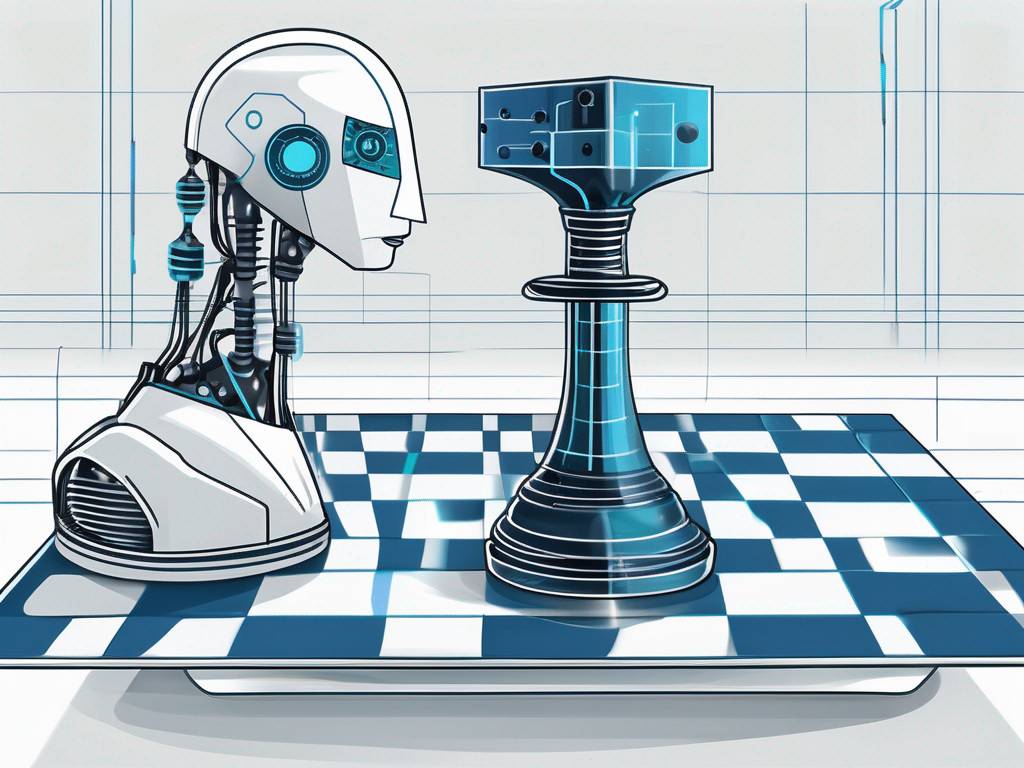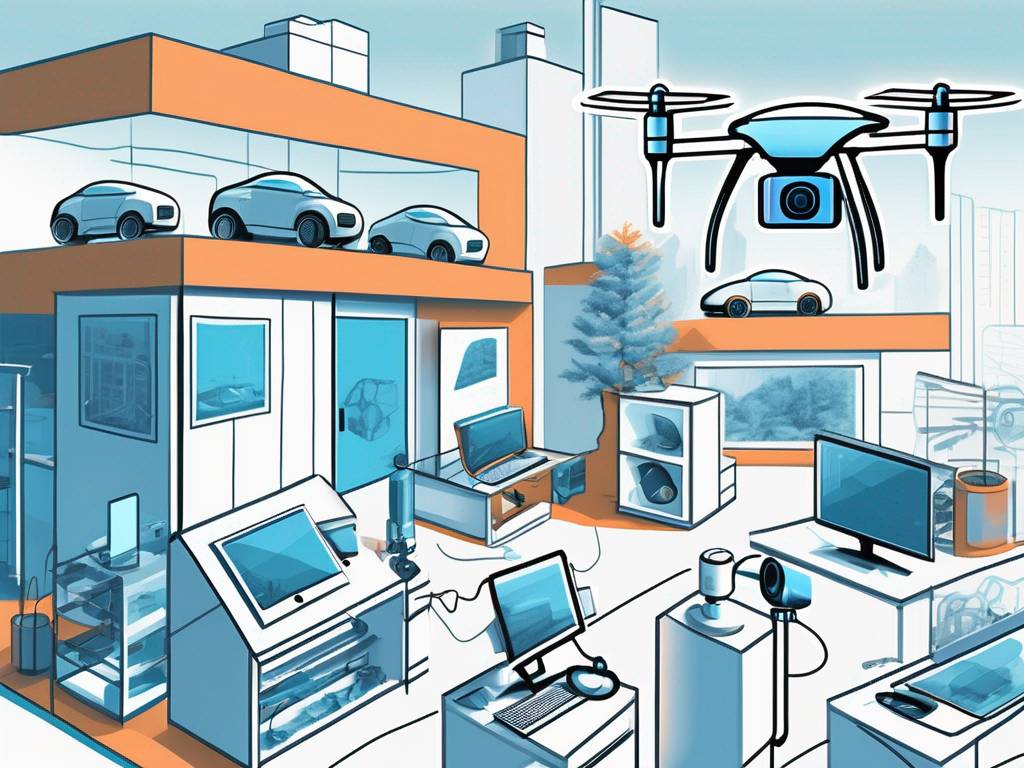AI Applications in Healthcare: Revolutionizing the Future of Medicine
Artificial Intelligence (AI) is dramatically transforming the healthcare industry, propelling it into a new era of advanced diagnostics, personalized medicine, and accelerated drug discovery. This article will explore the various applications of AI in healthcare and its potential to revolutionize the future of medicine.
Understanding AI & Its Role in Healthcare
Before delving into the applications of AI in healthcare, it is crucial to grasp the concept of artificial intelligence itself. AI can be defined as the simulation of human intelligence in machines that are programmed to think and learn like humans. In healthcare, AI algorithms and machine learning models analyze enormous amounts of data to identify patterns, predict outcomes, and make informed decisions.
Artificial intelligence encompasses a wide range of technologies, including machine learning, natural language processing, and computer vision. These technologies enable computers to analyze and interpret complex medical data, from electronic health records to medical images, providing healthcare professionals with valuable insights and assisting in decision-making processes.
One of the key components of AI in healthcare is machine learning. Machine learning algorithms have the ability to continuously learn from new data and improve their performance over time. This means that as more data is fed into the system, the AI algorithms become more accurate and effective in their analysis. This iterative process allows healthcare providers to stay up-to-date with the latest medical advancements and provide the best possible care to their patients.
Another important aspect of AI in healthcare is natural language processing (NLP). NLP enables computers to understand and interpret human language, allowing them to extract meaningful information from medical records, research papers, and even patient-doctor conversations. This technology not only saves time for healthcare professionals but also enhances the accuracy of diagnoses and treatment recommendations.
Computer vision is yet another powerful tool in the AI healthcare toolbox. By analyzing medical images such as X-rays, CT scans, and MRIs, AI algorithms can detect abnormalities, assist in early diagnosis, and even predict disease progression. This can significantly improve patient outcomes by enabling early intervention and personalized treatment plans.
The Intersection of AI & Medicine
The intersection of AI and medicine is a game-changer. By leveraging AI algorithms, healthcare providers can unlock the vast potential hidden within medical data, leading to more accurate diagnoses, treatment recommendations, and improved patient outcomes. AI has the power to revolutionize healthcare systems globally, enhancing efficiency, reducing costs, and transforming patient care.
Imagine a world where AI-powered virtual assistants can provide personalized healthcare advice and guidance to patients in real-time. These virtual assistants would have access to a vast amount of medical knowledge and the ability to analyze individual health data, allowing them to provide tailored recommendations and support. This would not only empower patients to take control of their health but also alleviate the burden on healthcare professionals.
AI also plays a crucial role in drug discovery and development. By analyzing massive datasets of chemical compounds, AI algorithms can identify potential drug candidates with higher accuracy and efficiency than traditional methods. This could significantly speed up the drug development process, bringing life-saving treatments to patients faster.
AI has the potential to revolutionize healthcare research. By analyzing large-scale genomic data, AI algorithms can identify genetic markers associated with diseases, paving the way for personalized medicine and targeted therapies. Additionally, AI can assist in clinical trials by identifying suitable candidates and predicting treatment responses, ultimately accelerating the development of new therapies.
However, it is important to note that while AI has immense potential in healthcare, it is not meant to replace healthcare professionals. Rather, it should be seen as a powerful tool that can augment their capabilities and support decision-making processes. The human touch and expertise will always be essential in providing compassionate and holistic care to patients.
The Impact of AI on Medical Diagnostics
One of the most promising applications of AI in healthcare is in the field of medical diagnostics. AI-powered algorithms are reshaping traditional diagnostic methods, enabling earlier and more accurate detection of diseases.
With the advancements in technology, AI has found its way into various aspects of medical diagnostics, revolutionizing the way diseases are detected and diagnosed. Let’s explore some of the key areas where AI is making a significant impact.
AI in Radiology & Imaging
Radiology and medical imaging play a crucial role in diagnosing and monitoring diseases. AI algorithms can analyze medical images, such as X-rays, MRIs, and CT scans, with remarkable precision and speed. By detecting subtle anomalies and patterns, AI can aid radiologists in identifying diseases like cancer, cardiovascular disorders, and neurological conditions at earlier stages.
For instance, AI algorithms can analyze mammograms to detect breast cancer at an early stage when it is more treatable. By flagging suspicious areas on the images, AI can assist radiologists in making more accurate diagnoses and reducing false negatives.
AI algorithms can also help in the interpretation of brain scans, enabling the early detection of conditions like Alzheimer’s disease and stroke. By analyzing the intricate details of the brain images, AI can identify even the smallest abnormalities that might go unnoticed by human eyes.
Predictive Analysis & Disease Detection
AI’s predictive capabilities extend beyond medical images. By leveraging machine learning techniques, AI can analyze vast amounts of patient data, including genetic information, lifestyle factors, and medical history, to detect early warning signs of diseases. This proactive approach enables healthcare professionals to take preventive measures and intervene before the onset of severe health conditions.
For example, AI algorithms can analyze genetic data to identify individuals who are at a higher risk of developing certain diseases, such as diabetes or heart disease. By identifying these high-risk individuals, healthcare providers can offer personalized interventions and lifestyle modifications to prevent or delay the onset of these conditions.
In addition to genetic data, AI algorithms can also analyze electronic health records (EHRs) to identify patterns and predict the likelihood of diseases. By considering various factors, such as age, gender, medical history, and symptoms, AI can assist healthcare professionals in making more accurate diagnoses and treatment plans.
AI-powered chatbots and virtual assistants can collect and analyze patient-reported symptoms and provide preliminary assessments. This can help patients get timely medical advice and determine whether further diagnostic tests are necessary.
AI is revolutionizing medical diagnostics by enhancing the accuracy and efficiency of disease detection. From analyzing medical images to predicting disease risks, AI algorithms are empowering healthcare professionals to provide better care and improve patient outcomes.
AI in Patient Care & Management
AI is not limited to diagnostics; it also has considerable potential in improving patient care and management.
When it comes to patient care and management, AI offers a wide range of possibilities. From personalized medicine to remote patient monitoring, AI algorithms are revolutionizing the way healthcare is delivered.
Personalized Medicine through AI
One-size-fits-all treatment approaches are no longer sufficient in modern medicine. Each individual is unique, and their healthcare needs should be addressed accordingly. This is where AI comes into play.
AI algorithms can analyze individual patient data, including genetic profiles and medical history, to develop personalized treatment plans. By taking into account specific genetic markers and previous medical conditions, AI can provide tailored recommendations that optimize treatment efficacy, minimize adverse reactions, and enhance patient outcomes.
For example, if a patient has a genetic predisposition to a certain disease, AI can identify this risk and suggest preventive measures to reduce the chances of developing the condition. Similarly, if a patient has a history of adverse reactions to certain medications, AI can recommend alternative treatments that are better suited for their individual needs.
AI in Remote Patient Monitoring
Remote patient monitoring (RPM) is an emerging healthcare trend that allows patients to be monitored outside traditional clinical settings. This is particularly beneficial for individuals with chronic conditions or those who live in remote areas with limited access to healthcare facilities.
AI-powered RPM systems can collect and analyze real-time patient data, enabling healthcare providers to remotely monitor vital signs, detect early signs of deterioration, and intervene promptly. This not only improves patient outcomes but also reduces the need for frequent hospital visits, saving both time and resources.
For instance, imagine a patient with heart disease who is being remotely monitored using an AI-powered RPM system. The system continuously tracks the patient’s heart rate, blood pressure, and other vital signs. If any abnormalities are detected, the system can automatically alert the healthcare provider, who can then take appropriate action, such as adjusting medication or scheduling a follow-up appointment.
AI can also analyze the collected data to identify patterns and trends that may not be immediately apparent to human healthcare providers. This can help in early detection of potential health issues and enable proactive interventions, ultimately leading to better patient outcomes.
AI in Medical Research & Drug Discovery
Artificial Intelligence (AI) has become a game-changer in the field of medicine, not only revolutionizing clinical settings but also transforming medical research and drug discovery processes.
One area where AI is making a significant impact is in genomic research. Genomic research generates vast amounts of data that can be overwhelming for human analysis. However, AI algorithms have the ability to quickly sift through this genomic data, identifying patterns and uncovering genetic markers associated with diseases. This newfound knowledge is invaluable in accelerating the development of targeted therapies, personalized treatments, and advancements in precision medicine.
AI is also playing a crucial role in accelerating the drug discovery process. Traditional drug discovery is known for being time-consuming and costly. However, with the power of AI, this process can be streamlined and made more efficient. AI algorithms analyze extensive datasets, predict drug-target interactions, and expedite the identification of potential drug candidates. This AI-powered drug discovery approach holds the promise of faster and more targeted therapies for various diseases, addressing unmet medical needs.
But how exactly does AI accomplish all of this? Well, AI algorithms are designed to learn from vast amounts of data and make predictions or decisions based on that learning. In the case of medical research and drug discovery, AI algorithms are trained on large datasets that include genomic data, clinical trial results, and drug databases. By analyzing this data, AI algorithms can identify patterns, correlations, and potential drug-target interactions that may have been missed by human researchers.
AI algorithms can also take into account various factors that influence drug efficacy, such as patient demographics, genetic variations, and environmental factors. This comprehensive analysis allows AI to provide insights and recommendations that can guide researchers in their quest to develop new drugs and treatments.
Another advantage of AI in medical research and drug discovery is its ability to handle the complexity and scale of the data involved. Genomic data, for example, consists of billions of base pairs, and analyzing this data manually would be a monumental task. AI algorithms, on the other hand, can process and analyze this data at a speed and scale that far surpasses human capabilities.
AI algorithms can also learn from previous drug discovery successes and failures, enabling them to make more accurate predictions and recommendations. This iterative learning process allows AI to continuously improve its performance and increase the chances of identifying successful drug candidates.
AI’s impact in medical research and drug discovery is undeniable. From genomic research to drug discovery, AI algorithms are transforming the way we approach these fields. With their ability to analyze vast amounts of data, identify patterns, and make predictions, AI algorithms are accelerating the development of targeted therapies and personalized treatments. The future of medicine looks promising, thanks to the power of AI.
Ethical Considerations of AI in Healthcare
While the potential of AI in healthcare is vast, it also raises ethical considerations that need to be carefully addressed.
Data Privacy & Security Concerns
Utilizing AI in healthcare involves the collection and analysis of massive amounts of sensitive patient data. To ensure patient privacy and data security, robust safeguards, such as stringent encryption protocols and access controls, must be implemented. Ethical frameworks should guide the responsible and transparent use of patient data in AI applications.
AI & Medical Decision-Making
Although AI algorithms can provide valuable insights, the final medical decision-making should ultimately rest with healthcare professionals. AI should be viewed as a supportive tool rather than a replacement for human expertise. Striking the right balance between human judgment and AI recommendations is critical to maintaining patient trust and ensuring responsible healthcare practices.
AI is poised to be a catalyst for significant advancements in healthcare. From revolutionizing diagnostics and personalized medicine to accelerating drug discovery, AI applications are reshaping the future of medicine. While navigating ethical considerations, embracing AI’s potential can lead to more efficient healthcare systems, improved patient outcomes, and ultimately, a healthier society.

 hello@westlink.com
hello@westlink.com  (866) 954-6533
(866) 954-6533  700 N Colorado Blvd,
700 N Colorado Blvd,







Comments